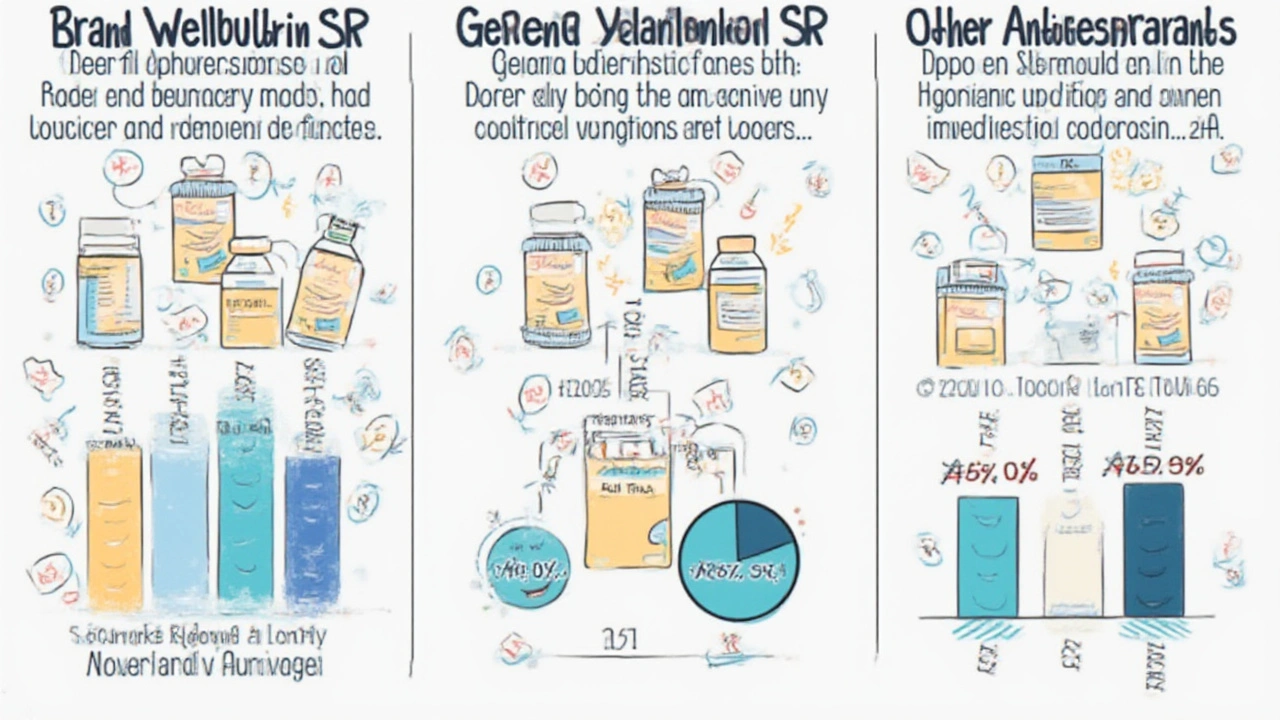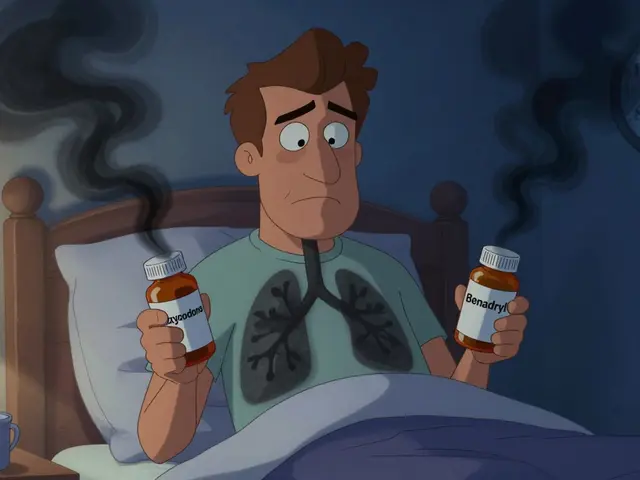What would you do if your monthly medication suddenly cost as much as your grocery bill? It’s a jarring moment—and it happens to people prescribed Wellbutrin SR all the time. Big pharma’s price game can blindside you, especially when your insurance doesn’t fill the gap. People scramble on pharmacy apps, call their doctors, and obsessively count their tablets hoping to avoid a refill for one more week. If you’ve been caught in this mess, you know: understanding generic versus brand pricing for Wellbutrin SR isn’t just about numbers. It’s about your wallet, your coverage, and—sometimes—your ability to stay on treatment at all. Let’s peel back the label and get real about what you’re paying for.
Brand vs Generic Wellbutrin SR: What’s the Real Price Difference?
Ever stood in a pharmacy and gotten sticker shock at the Wellbutrin SR price? You’re not alone. Walk into any retail chain—Walgreens, CVS, Rite Aid—and the difference between brand Wellbutrin SR and generic bupropion SR sometimes feels so drastic you’ll assume it’s a mistake. Here are some hard numbers: Brand Wellbutrin SR (bupropion), can push $350-$500 for a 30-day supply at standard dosage—often Wellbutrin SR 150mg twice daily. Generic versions, though, can dip as low as $30-$60—sometimes under $15 if you use a good discount coupon.
Now, why the gap? Brand-name drugs ride exclusive patents for years. That’s pharma’s payoff for inventing them. After the patent, generics with the same active ingredient surge into the market, instantly slashing prices. Same FDA rules, similar ingredients—but without the splashy labeling and sales reps. The FDA says most generics match their brand counterparts in absorption rate and effectiveness within a tight 80-125% range, so you’re not just buying cheaper chalk.
But here’s the rub: not all pharmacies play fair. Mail-order options, membership clubs like Costco, and even supermarket pharmacies might undercut chains by 30-60%. Sometimes, prices are lower for cash than using insurance (which boggles the mind). Insurance copays can be unpredictable: you might pay $10 for generic but get hit with a $100 copay for the brand, even after your deductible vanishes. Occasionally, your insurance “prefers” the brand or generic, so your price can change mid-year.
Here’s a pro tip: always check prices at multiple pharmacies, including online ones like GoodRx or Blink Health—even if you have insurance. Don’t forget to ask your pharmacist for their discount cards. Many plans offer 90-day mail-order options with reduced pricing if you can plan ahead.
One odd but real concern: not all bupropion generics are identical. A few years ago, certain generics came under FDA scrutiny for not matching the brand’s effectiveness, leading to recalls and reformulations. This is rare now, but if your mood changes after a switch, let your doctor know. You’re not imagining it—sometimes a small manufacturing tweak makes a subtle difference for sensitive people.

Insurance Coverage and What Actually Gets Paid
It sounds simple: you pay your monthly premium, get your prescription, and your insurance takes care of the rest. But if you’ve ever tried to fill brand-name Wellbutrin SR, you know that’s just not how it works. Some insurance plans outright refuse to cover brands, nudging you to generics. For brand-only coverage, you could be stuck with the dreaded “non-formulary” charge—sometimes hundreds per fill, if you’re lucky enough to get coverage at all.
PPOs, HMOs, Medicare Part D—they all play by their own rules. Some require step therapy, meaning you must first try generic bupropion and prove you “failed” it before they’ll even think about covering the brand. Prior authorization is another hoop to jump: your doctor writes a letter, waits for faxes, and maybe gets approval… or maybe not. High deductible plans? You might pay full retail until you’ve shelled out thousands.
But if your prescriber documents a true medical reason for the brand—like severe reactions to dyes or fillers in generics—your odds for an exception improve. Keep good records. Download your insurance’s drug list (formulary) each January, because it changes. One year generic is covered, the next you’re paying double.
Medicare stands out for strictness. Most plans steer you toward generics—and sometimes only certain manufacturers. Medicaid, on the other hand, varies state to state. Private insurance sometimes shuffles generic manufacturers behind the scenes to get the best rebate, which can cause a pill color or shape change each month. If your Wellbutrin SR suddenly looks unfamiliar, ask your pharmacist which supplier it came from. Don’t hesitate to clarify with your doctor if a switch affects your mental state—insurance occasionally covers special circumstances, but only if you raise the issue fast and persistently.
Finally, don’t be afraid to work the system with manufacturer copay cards. Brand-name Wellbutrin sometimes comes with savings programs that can deep-discount your copay, occasionally bringing it below the cost of generic—especially for those with high deductibles. Always read the fine print, though, since these cards don’t play nicely with government insurance like Medicare or Medicaid and can expire without warning.

Alternative Medications: What Else Is Out There?
Is Wellbutrin SR your only shot? Hardly. The good news: there’s a rising stack of alternatives for depression that can make a huge difference in price and, for some, in side effect profiles. This is where things get interesting. Not every brain likes Wellbutrin—some people find relief elsewhere, and some find other meds even cheaper.
First, bupropion is available in several forms: SR (sustained release), XL (extended release), and immediate-release. SR is the classic twice-a-day version, but XL only needs a morning swallow. For some, insurance covers one form better than another, even though the base ingredient is identical. Ask your doctor to write for "bupropion SR" and "bupropion XL" on different scripts and run both through your insurance—sometimes XL is cheaper, and sometimes it’s the other way around, with wild regional swings in pharmacy pricing.
Looking outside bupropion entirely? Other popular prescription antidepressants in similar cost brackets include sertraline (Zoloft), fluoxetine (Prozac), citalopram (Celexa), venlafaxine (Effexor), and duloxetine (Cymbalta). Most have generic forms and may cost even less than generic Wellbutrin, especially with insurer-preferred drug lists. Don’t get stuck on a single option—sometimes doctors have samples or can help you trial a new med to see if your insurance steps in with better coverage.
If you’re on the hunt, don’t trust random search results. Stick to guides with up-to-date pharmacy pricing and insurance notes, like this list of alternatives for Wellbutrin. Switching is about more than just beating sticker shock—it’s about which meds fit your life, your response, and your budget. Don’t forget to check for side effects, withdrawal risks, and cross-check with your other meds—especially if you have conditions like epilepsy, high blood pressure, or you’re on other psychiatric meds.
One tip: if you’re pressed for cash and have no or bad insurance, some states have prescription assistance programs, and many large manufacturers offer reduced cost for brand-name meds, if you meet financial hardship criteria. Clinics and nonprofit pharmacies sometimes have samples, especially in urban centers. Free pharmacy comparison apps can help you identify where the best deal is (sometimes it’s not the pharmacy nearest to you).
Curious about less conventional alternatives? Some people talk about natural supplements or off-label meds, but proceed with major caution. FDA oversight is thin there. Your safest bet is always consulting your doctor or psychiatrist before making switches, especially since depression can be unpredictable if you go cold turkey or swap messily between drugs.
So, is the hunt for lower prices, better insurance coverage, or new medication options worth it? It has to be—if for no other reason than meds that bust your budget rarely stick. With some work, you can land on the version, form, and pharmacy that lets you manage your depression and your wallet, without tradeoffs. That’s a cost comparison that actually matters.





One comment
When confronting the disparity between brand and generic Wellbutrin SR, the first prudent step is to verify the exact National Drug Code (NDC) at multiple dispensing locations. The FDA guarantees bioequivalence within an 80‑125 % confidence interval, so the therapeutic outcome should remain consistent across reputable manufacturers. Many chain pharmacies publish real‑time price listings online; comparing those figures against GoodRx or Blink Health can reveal savings of up to eighty percent. If you possess a high‑deductible plan, consider a 90‑day mail‑order program, which often reduces per‑tablet cost while preserving continuity of care.
Ah, the tragic theater of pharmaceutical economics! One stands upon the pharmacy counter, clutching a prescription, only to be blindsided by a price tag that seems to have been forged in the fires of Olympus itself. Yet, amid this melodrama, the sagacious mind discerns that the alchemy of patents and market exclusivity fuels such extravagance. By invoking the ancient rite of price‑shopping-consulting both digital apothecaries and local dispensaries-one can reclaim a modest portion of the treasury otherwise devoured by corporate leviathans.
Sure, let’s all just ignore the fact that a “generic” might actually be a cleverly disguised brand with a fresh coat of paint. The real scandal is that the system expects us to trust any pill as only it’s approved-no need for transparency, right?
Actually, the FDA’s bioequivalence standards are pretty stringent, so most generics truly mirror the brand’s performance. If you ever feel a subtle shift in mood after a switch, flag it with your pharmacist-they can trace the manufacturer batch for you 😊. Staying proactive helps ensure you’re not accidentally sacrificing efficacy for savings.
In the grand calculus of healthcare economics, the dichotomy between proprietary and non‑proprietary formulations represents a microcosm of market forces tempered by regulatory oversight. The principle of therapeutic equivalence, founded upon rigorous pharmacokinetic parameters, undergirds the legitimacy of generic substitution. Consequently, a discerning patient ought to interrogate both formulary placement and out‑of‑pocket expenses, thereby harmonizing clinical fidelity with fiscal responsibility.
Review your plan’s formulary each year; small changes can dramatically affect your copay.
I understand how overwhelming this can feel, and I want to assure you that you’re not alone in navigating these complexities. Begin by compiling a list of your usual pharmacies and their quoted prices for both brand and generic bupropion SR. Then, cross‑reference those numbers with any available manufacturer coupons or patient assistance programs. Often, a simple phone call to the pharmacy’s manager can unlock a discount that isn’t advertised online.
Did you know that some insurance plans actually favor extended‑release formulations over sustained‑release, purely due to negotiated rebate structures? It pays to ask your prescriber whether a bupropion XL script could be covered at a lower tier. By taking these proactive steps, you not only safeguard your mental health but also empower yourself against unnecessary financial strain.
Let’s cut through the nonsense: if your insurer is throwing a non‑formulary bill at you, invoke the step‑therapy exemption and demand a prior‑authorization waiver. Most plans have a clause that obligates them to cover the brand when a documented adverse reaction to the generic exists. Document everything-doctor’s notes, side‑effect logs, and pharmacy receipts-and present a concise case to the benefits manager.
Check GoodRx for the cheapest generic price in your area.
When the reimbursement algorithm flags a brand as “cost‑ineffective,” the downstream impact cascades into a denial cascade that forces the patient into a therapeutic abyss.
Navigating the labyrinthine terrain of prescription coverage often feels like an expedition through an ever‑shifting desert, where oasis‑like price breaks appear and vanish with bewildering frequency. First, one must recognize that the formulary tier your plan assigns to bupropion SR is not static; annual renegotiations between pharmacy benefit managers and manufacturers routinely reshuffle the hierarchy. Second, the presence of a step‑therapy requirement acts as a gatekeeper, compelling you to trial a generic formulation before any brand‑name consideration is entertained, regardless of your clinical history. Third, documenting a genuine adverse reaction to the generic-be it a hypersensitivity to an inactive filler or an atypical pharmacodynamic response-creates the evidentiary basis for a necessary exception request. Fourth, the prior‑authorization petition must be meticulously crafted, incorporating succinct yet comprehensive physician attestations, laboratory data if applicable, and a clear articulation of the therapeutic gap left by the generic. Fifth, upon submission, the pharmacy benefits administrator typically responds within a prescribed window, though delays are not uncommon, and an appeal may be required should the initial decision be unfavorable. Sixth, many manufacturers provide copay‑card programs that, while often excluded from federal plans, can be strategically employed for commercial insurance carriers to offset out‑of‑pocket expenditures. Seventh, leveraging online discount platforms such as Blink Health or SingleCare can further depress the cost, especially when combined with a mail‑order 90‑day supply. Eighth, never underestimate the power of a direct conversation with the pharmacist; they often possess real‑time insight into manufacturer rebates that are not reflected in the printed price. Ninth, maintain a personal log of medication costs, refill dates, and any side‑effect fluctuations; this data becomes invaluable during appeals or when consulting your prescriber about potential formulation switches. Tenth, explore state‑run pharmaceutical assistance programs, which can provide supplemental funding for individuals meeting low‑income thresholds. Eleventh, remember that while generic bupropion SR and XL share the same active moiety, insurance plans may categorize them differently, offering a cost advantage for one over the other. Twelfth, if you encounter a brand‑only formulary designation, consider requesting a therapeutic equivalence waiver, citing peer‑reviewed literature that underscores the clinical parity of generics. Thirteenth, stay vigilant for promotional periods; some insurers temporarily lift prior‑authorization requirements during specific months, presenting a narrow window for cost‑saving switches. Fourteenth, always verify the National Drug Code on your prescription label to ensure you receive the intended manufacturer, as some chains rotate suppliers without patient notification. Fifteenth, after achieving a stable, affordable regimen, periodically re‑audit your medication expenses-what is optimal today may become suboptimal tomorrow. Finally, adopt a proactive mindset: the more informed and engaged you are, the less likely you are to be caught off‑guard by sudden price spikes, and the more empowered you become in steering your own health care journey.
One might argue that the commodification of mental health treatment reflects a broader societal malaise, wherein profit eclipses compassion and the sanctity of well‑being is relegated to a ledger entry.
Indeed, the healthcare system’s labyrinthine pricing structure can feel like an endless maze-full of twists, turns, and hidden fees!!! It is essential, therefore, to arm oneself with knowledge, persistence, and a dash of optimism!!!
In contemplating the intricate interplay between pharmaceutical pricing and patient access, it becomes evident that systematic vigilance is paramount. By routinely consulting both the insurer’s formulary updates and independent price‑comparison tools, one can navigate toward the most economical option without compromising therapeutic efficacy. Moreover, engaging in transparent dialogue with healthcare providers ensures that any adverse reactions to generics are promptly addressed, potentially unlocking brand‑specific coverage when truly warranted. Ultimately, a balanced approach-melding analytical scrutiny with compassionate self‑advocacy-serves both the mind and the wallet 🌟.